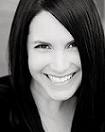How do you translate your ideas from raw thoughts and images into a story?
"Ha! If I knew the actual answer to that, I would totally bottle it up and sell it. Let's just say the formula involves a lot of tears, pajamas, chocolate, revising, hair-pulling, teeth-gnashing, coffee, and magic fairy dust. And tears. Did I mention tears?" - Sarah Ockler, author of Bittersweet.
"Sheer, bloody-minded logic! No, really!
I walk into a story knowing certain really random things about it: Right now, that's the ghosts of superheroes, and abandoned ferris wheels; the inside of a terrible, hurt, vindictive relationship, Vancouver, stormy skies, crows, and the tightrope walk between vigilanteism and civic responsibility. And since a list of things I just gut-deep know about a story is really not all that helpful when it comes to writing actual words, I start shuffling what I have around constantly: trying to find the lines of logic between them, finding how they might connect. And when they connect? I figure out what the implications of those connections are: "If that's true, then that would mean this also has to be true." And apply that back to the other things…" - Leah Bobet, author of Above.
"To me, storytelling is like throwing a football – it’s an ability you’re born with that can only be honed by practice. You can’t really learn it if you don’t have it in you. That’s why I’m not in the NFL." - Aaron Karo, author of Lexapros & Cons.
"I see scenes as I write them, I try to be inside them, and I attempt to write what I’m seeing and feeling. Sometimes it works better than others." - Ann Stampler, author of Where It Began.
 "Before I ever sit down to write the first page, I spend a lot of time mapping out how the story’s going to go, trying to pull random, brainstormed ideas into some kind of linear story, trying to figure out who my characters are and what they want, trying to figure out what kind of ending my beginning deserves. But it never quite comes together until I find the right first line. Only once I have that, and the book has its voice, can I actually start the story." - Robin Wasserman, author of The Book of Blood and Shadow.
"Before I ever sit down to write the first page, I spend a lot of time mapping out how the story’s going to go, trying to pull random, brainstormed ideas into some kind of linear story, trying to figure out who my characters are and what they want, trying to figure out what kind of ending my beginning deserves. But it never quite comes together until I find the right first line. Only once I have that, and the book has its voice, can I actually start the story." - Robin Wasserman, author of The Book of Blood and Shadow. "It's always more difficult than I think it will be. Sometimes it takes several attempts at a first draft before the story is going the way I want it to. As with anything, it's a matter of getting back up on that horse each time you fall off." - Alissa Grosso, author of Ferocity Summer.
"The raw thoughts and images are a daydream. The story is daydreaming through your fingers. It just sort of happens." - Kendare Blake, author of Girl of Nightmares.
"Once I have the beginnings of an idea, I let it percolate. I don’t write a single word until the first raw idea collides with a second idea, and possibly a third, and so on. Stories are built on idea amalgams." - Jennifer Bosworth, author of Struck.
"I give myself permission to follow an idea on paper without much planning. Sometimes I dream the place first and the characters begin to populate it. Other times, the first line or the character comes to me first and I create the world around her. The rest unfolds as I write." - Meg Medina, author of The Girl Who Could Silence the Wind.
"I mentally vomit onto the page. Truly, I’m not an outliner or a person who maps to word count goals. I get an idea, and just write until I have to go pick up my kids from preschool." - Cat Patrick, author of Revived.
"That's the question I ask myself every day. Usually, I type it really fast so as not to lose the idea, and then go back and add language that evokes the mood that I "saw" in my head. I find that I often need to slow down my original offering, adding more white space for better reflection." - Gwen Hayes, author of Dreaming Awake.
"Writing fiction (like any creative endeavor, I imagine) is a partnership between unconscious and conscious. Your unconscious feeds on your senses and experiences, and digests ideas and images; then it’s up to your conscious—with its cognitive and deductive properties, and its vocabulary—to interpret that coherently." - Nina Malkin, author of Swear.



















































No comments:
Post a Comment